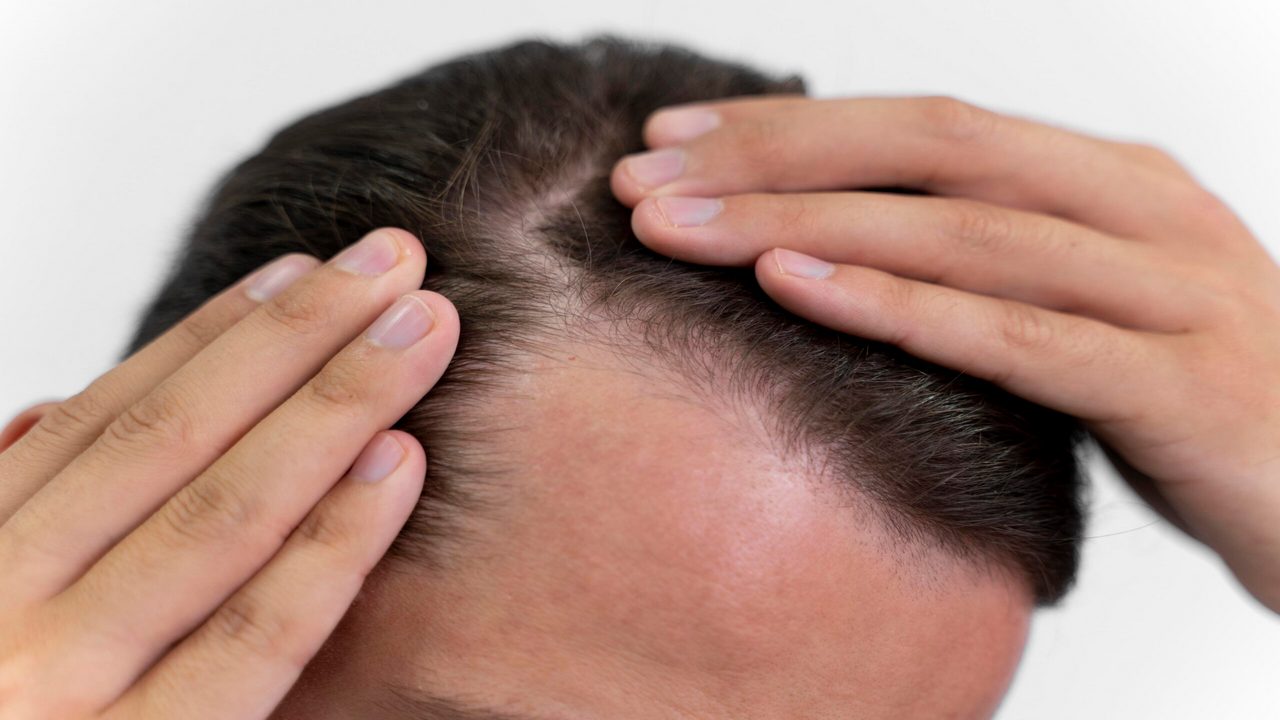Introduction
Meet the three letter word that is causing so much hair-related heartache, DHT. Abbreviated as DHT (dihydrotestosterone), it is a hormone produced by testosterone, which is very important in male traits, but it also has a darker side, as in the case of hair loss.Have you ever thought about why your hairline receded or you are losing more hair on your head as each year passes? DHT is the answer.
Male pattern baldness or hormonal acne, it can put you ahead of the game in controlling your health. So what about this super hormone ? Let us take a plunge into it and find out how its blockers can rescue you.

The Science Behind DHT
5-alpha reductase then converts testosterone to DiHydroTestosterone .Whereas testosterone drives most of the male traits, such as muscle development and sex drive, it is more powerful and has a greater affinity to androgen receptors.
DHT vs Testosterone
There is testosterone, the big brother and there is DHT, the supercharged brother. Whereas both are vital, it is more potent in determining male sexual development and physical characteristics such as body hair and deep voice.
Effects of DHT on the Body
Positive Roles
- Supports male puberty and sexual function
- Maintains muscle mass and bone density
- Aids in prostate development
Negative Effects
- Miniaturization of hair follicles
- Acne overproduces sebum
- Enlarged prostate (BPH)
- Men and women baldness
In case your body is hypersensitive to it, even the regular amounts of it can cause the undesirable effects, such as hair loss or oily skin.
DHT and Hair Loss
This is where the plot thickens- It does not freely float around in a harmless way. It wears down your hair follicles as time goes on and makes them shrink and become weak until they cease to produce hair anymore.
Male Pattern Baldness
The commonest type of hair loss in men is androgenetic alopecia; this is directly associated with this. It begins at the temples and crown and goes to full-blown baldness.
Female Hair Thinning
Though women do not go bald, it can cause the part line to recede and the hair to become less dense in general.
How Do DHT Blockers Work?
They prevent the enzyme 5-alpha reductase converting testosterone into DHT.By decreasing the levels ofit, the hair follicles are maintained and the loss of hair can be slowed or even reversed.
Other blockers are androgen receptor blockers and itdoes not act on hair follicles and sebaceous glands.
Types of DHT Blockers
1. Prescription
Finasteride (Propecia)
One of the most popular DHT blockers, approved by FDA to be used in the treatment of male pattern baldness is finasteride. It decreases it to 60-70 percent.
Dutasteride
Dutasteride affects even stronger than finasteride due to its ability to inhibit not only the type I, 5-alpha reductase enzyme but also type II, which reduces the level of DHT even more.
2. Natural
In case you are not so sure about drugs, there are natural blockers which are a milder solution:
- Saw Palmetto: 5 alpha reductase inhibitor.
- Pumpkin seed oil: The oil has phytosterols which inhibit the dht.
- Stinging Nettle: Prevents the conversion of it and Reduces inflammation
3. Topical
Shampoos and Serums
Hair products that contain anti-DHT should include ingredients such as caffeine, ketoconazole or saw palmetto.
Minoxidil + DHT Blockers
Other formulas are composed of hair growth stimulants and blocking agents to get the most out of them.
DHT and Skin Conditions
It doesn’t stop on your scalp, it also stimulates sebaceous (oil) glands.
Acne and Oily Skin
Too much of this may trigger an overproduction of oil in your skin and clogged pores, acne, and inflammation can occur.
DHT in Women: A Hidden Hormonal Culprit
It is usually related to men; however, it affects women as well, just in a more subtle manner.
Female Hair Loss
When It is high in a woman, she may develop a complaint of hair thinning especially at the top of her head.
Polycystic Ovary Syndrome (PCOS)
In PCOS, too much androgen (including this) leads to symptoms such as excess hair growth on the face, acne and irregular periods.
Managing DHT Through Lifestyle
Not all the time must one be taking a pill to balance the it. Simple modifications in the way of life can serve as a great difference.
Diet
Eat low sugar, low fat foods. Include:
- Zinc dense foods (pumpkin seeds oysters).
- Green tea
- Anti-inflammatory foods (berries, leafy greens)
Exercise
It normalizes hormones and enriches blood flow to the head.
Stress Management
Long-term stress boosts cortisol and that indirectly elevates DHT Hormones.
Risks and Side Effects of DHT Blockers
Mostly safe, Its blockers have the possibility to induce:
- Decreased sexual desire or impotence
- Gynecomastia (enlarged breast tissue in men)
- Depression or anxiety (in a very rare case)
- Hormonal disorders of womanhood
One should always advise a doctor before commencing any DHT-blocking therapy.
When to See a Doctor
And when you are losing hair suddenly or severely, have hormonal acne, or sexual health changes, it is time to speak with a medical professional. To be sure of your DHT levels, a blood test will be able to confirm them and lead you in your treatment.
Conclusion
It is an important part of the body, but excess DHT in sensitive people may result in many unpleasant things, including hair loss and acne. Fortunately, the correct know-how and an appropriate mix of blockers, lifestyle changes, and medical advice will help you regain control of your health and hair.
Don not turn it into the secret saboteur. Be proactive, discuss with your doctor, and find out what is best suited to treat you.
FAQs
Mayank Rawat
Certified Skincare Consultant and passionate researcher, I specialize in exploring skincare ingredients and haircare actives. Always eager to stay ahead of trends, I continuously update my knowledge to bring science-backed solutions. Dedicated to helping others achieve healthy skin and hair through expertise and innovation.